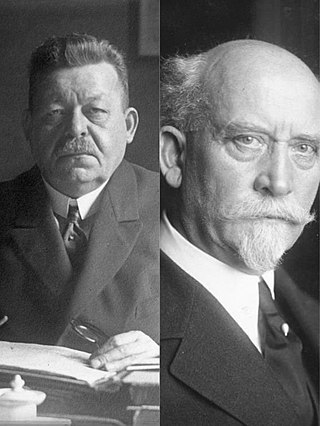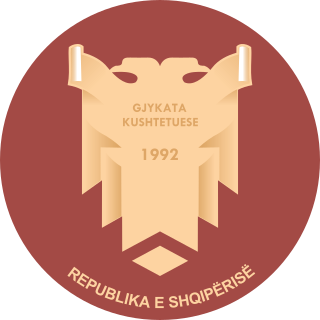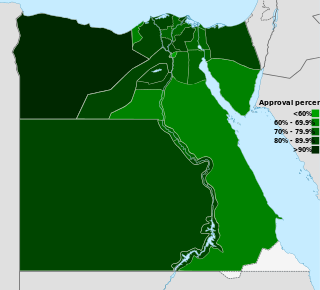| ||||||||||||||||||||||
| Results | ||||||||||||||||||||||
|---|---|---|---|---|---|---|---|---|---|---|---|---|---|---|---|---|---|---|---|---|---|---|
| ||||||||||||||||||||||
 |
|---|
A constitutional referendum was held in Albania on 22 November 1998. [1] Voters were asked whether they approved of the constitution. It was approved by 93.5% of voters with a turnout of 50.6%, [2] and came into force on 28 November. [3]
| ||||||||||||||||||||||
| Results | ||||||||||||||||||||||
|---|---|---|---|---|---|---|---|---|---|---|---|---|---|---|---|---|---|---|---|---|---|---|
| ||||||||||||||||||||||
 |
|---|
A constitutional referendum was held in Albania on 22 November 1998. [1] Voters were asked whether they approved of the constitution. It was approved by 93.5% of voters with a turnout of 50.6%, [2] and came into force on 28 November. [3]
In September 1997 a 21-member Constitutional Commission was formed by Parliament, including twelve members of the ruling Socialist Party and Social Democratic Party and nine members of the Democratic Party. The Commission was given a six-month timeframe for producing a draft. [3]
The public were widely consulted during the process using surveys, forums and public meetings. Despite the Democratic Party boycotting the Commission until the latter stages of the process and a coup attempt by its leader Sali Berisha, the Commission produced its draft constitution on 4 August 1998 having obtained a six-month extension. After its publication further hearings and debates were held, resulting in around a quarter of the articles in the first draft being amended. [3]
The second draft was then approved by Parliament on 21 October 1998 with 115 in favour and none against (the other 40 MPs, mostly Democratic Party members, did not attend the vote). [3]
| Choice | Votes | % |
|---|---|---|
| For | 879,488 | 93.5 |
| Against | 61,000 | 6.5 |
| Invalid blank votes | 27,000 | – |
| Total | 968,346 | 100 |
| Registered voters/turnout | 1,914,859 | 50.6 |
| Source: Nohlen & Stöver | ||
Note that the data is inconsistent, possibly due to mistakes at polling stations not being corrected at higher levels. [2]

A referendum on the Treaty establishing a Constitution for Europe was held in Spain on Sunday, 20 February 2005. The question asked was "Do you approve of the Treaty establishing a Constitution for Europe?". The consultative referendum on ratification of the proposed Constitution for the European Union was approved by 81.8% of valid votes, although turnout was just 41.8%, the lowest since the end of the Franco era.
A four-part referendum was held in Ukraine on 16 April 2000. The referendum was called by President Leonid Kuchma, and asked voters whether they approved of four amendments to the constitution that would increase the powers of the President and introduce an upper chamber.

Federal elections were held in Germany on 19 January 1919, although members of the standing army in the east did not vote until 2 February. The elections were the first of the new Weimar Republic, which had been established after World War I and the Revolution of 1918–19, and the first with women's suffrage. The previous constituencies, which heavily overrepresented rural areas, were scrapped, and the elections held using a form of proportional representation. The voting age was also lowered from 25 to 20. Austrian citizens living in Germany were allowed to vote, with German citizens living in Austria being allowed to vote in the February 1919 Constitutional Assembly elections.

A seven-question referendum was held in Belarus on 24 November 1996. Four questions were put forward by President Alexander Lukashenko on changing the date of the country's independence day, amending the constitution, changing laws on the sale of land and the abolition of the death penalty. The Supreme Council put forward three questions on constitutional amendments by the Communist and Agrarian factions, local elections and the national finances.
A constitutional referendum was held in Greece on 15 November 1968. Voters were asked whether they wished to ratify a new constitution prepared by the dictatorial regime. It was approved by 92.1% of voters, with a voter turnout of 77.7%.

A constitutional referendum was held in France on 21 October 1945. Voters were asked whether they approved of the Assembly elected on the same day serving as a Constituent Assembly, and whether until a new constitution was approved, the country would be governed according to a proposed set of laws that appeared on the ballot paper. If the first proposal had not been approved, the Third Republic would have been restored, but its approval led to the elected Assembly drafting a constitution and proposing it to the people a year later, resulting in the creation of the Fourth Republic. Both were approved by wide margins with a turnout of 79.8%.

A constitutional referendum was held in France on 5 May 1946. Voters were asked whether they approved of a new draft Constitution proposed by the Constituent Assembly elected in 1945.

A constitutional referendum was held in Denmark on 23 May 1939. Voters were asked whether they approved of a new constitution. Although it was approved by 91.9% of those who voted, a turnout of only 48.9% meant that the percentage of eligible voters approving it was only 44.46%, below the 45% required by the existing constitution of 1915.
Early parliamentary elections were held in Montenegro on 29 March 2009. In addition to elections for the unicameral Parliament of Montenegro, concurrent local elections were held in Nikšić and Budva, as well as municipal presidential elections in Herceg Novi and Tivat. The parliamentary elections were the eighth since the reintroduction of multi-party system in 1990, and the second since regaining full independence in 2006.
Parliamentary elections were held in Albania on 24 June 2001. The result was a victory for the ruling Socialist Party of Albania, which won 73 of the 140 seats, resulting in Ilir Meta remaining Prime Minister. Voter turnout was 54%.

The Constitutional Court of the Republic of Albania is the highest authority in Albania's legal system that defends and assures the respect of the Constitution of Albania.

The temporary de factoConstitution of Sudan is the Draft Constitutional Declaration, which was signed by representatives of the Transitional Military Council and the Forces of Freedom and Change alliance on 4 August 2019. This replaced the Interim National Constitution of the Republic of Sudan, 2005 (INC) adopted on 6 July 2005, which had been suspended on 11 April 2019 by Lt. Gen Ahmed Awad Ibn Auf in the 2019 Sudanese coup d'état.

A constitutional referendum was held in Egypt on 19 March 2011, following the 2011 Egyptian revolution. More than 14 million (77%) were in favour, while around 4 million (23%) opposed the changes; 41% of 45 million eligible voters turned out to vote.
A constitutional referendum was held in Albania on 7 November 1994. Voters were asked whether they approved of the new constitution published on 6 October, which would have given more power to the country's president. However, it was rejected by voters, with just 43.6% in favour. Voter turnout was 84.4%.

Constitutional Assembly elections were held in Latvia on 17 and 18 April 1920. The Latvian Social Democratic Workers' Party emerged as the largest party in the Constitutional Assembly, winning 57 of the 150 seats. The elections were boycotted by communist parties. The Constitutional Assembly was responsible for drafting a constitution, which was approved on 15 February and promulgated on 7 November 1922.
A referendum on the electoral system was held in Slovenia on 8 December 1996. Voters were given three options to approve or not; a compensatory system, a two-round majority system and a proportional representation system at a national level.

A referendum on the presidency was held in Lithuania on 23 May 1992. Voters were asked whether they approved of restoring the institution of the presidency. It was initiated by Sąjūdis.

A consultative constitutional referendum was held in Moldova on 23 May 1999. It was initiated by President Petru Lucinschi and asked voters whether they approved of changing the system of government to a presidential system. The proposal was approved by 64% of voters. However, the Party of Communists of the Republic of Moldova and the Alliance for Democracy and Reforms opposed Lucinschi, and were able to vote several constitutional changes through parliament on 5 July 2000. The changes reduced the powers of the president and strengthened the parliament and government.
Two referendums were held in Switzerland in 1887. The first was held on 15 May, asking voters whether they approved of a federal law on spirits, and was approved by 65.9% of voters. The second was held on 10 July, asking voters whether they approved of an amendment made to article 64 of the federal constitution, and was approved by 77.9% of voters and 20.5 cantons.
An Icelandic Constitutional Council (Stjórnlagaráð) for the purpose of reviewing the Constitution of the Republic was appointed by a resolution of Althingi, the Icelandic parliament, on 24 March 2011. Elections were held to create a Constitutional Assembly (Stjórnlagaþing) body, but given some electoral flaws, had been ruled null and void by the Supreme Court of Iceland on 25 January 2011, leading the parliament to place most of the winning candidates into a Constitutional Council with similar mission. The question of whether the text of the proposed constitution should form a base for a future constitution was put to a non-binding referendum, where it won the approval of 67% of voters. However, the government's term finished before the reform bill could be passed, and following governments have not acted upon it.